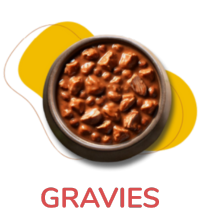Navigating canine nutrition can seem like trekking through a dense, unmapped forest, and when you get to the topic of breed-specific diets, it can be daunting. This system of feeding your dog implies that what goes on your dog's plate should not only be determined by their size, age, or activity level, but also by their breed. Let's go through understanding breed-specific nutritional needs, how to customise diets for maximum health, and dispelling common myths on this subject.
Understanding Breed-Specific Nutritional Needs
The underlying concept of breed-specific nutrition is that various dog breeds have different nutritional needs due to their genetic heritage and original purpose. For instance, working breeds such as Siberian Huskies, developed for their ability to pull sledges over long distances, require different levels of energy and nutrients than an inactive lap dog like the Shih Tzu.
- Labrador Retriever: The Active Family Dog
Nutritional Needs: High energy requirements and obesity predisposition require Labs to have a balanced diet that's not calorie-dense but still meets their energy, protein, and fat nutritional needs.
Optimal Diet: A high-protein diet with lean proteins to maintain muscle mass, with limited fat intake to keep weight in check. Add fibre-rich vegetables and whole grains for gastrointestinal health. Omega-3 fatty acids are needed for coat health.
Misconceptions: Most people think that Labs have a high appetite because of their size and energy level. However, they are actually susceptible to obesity, so their caloric intake must be closely monitored.



- German Shepherd: The Loyal Working Breed
Nutritional Needs: Prone to joint disorders such as hip dysplasia, German Shepherds may benefit from a diet supplemented with glucosamine and chondroitin. High-quality protein sources are also essential for their active lifestyle.
Optimal Diet: Medium-fat protein diet. Include joint supplements and fibrous foods for healthy digestive tracts, as they have sensitive stomachs.
Misconceptions: Most have the misconception that any high-energy breeds like German Shepherds need high-calorie food. Although they burn more energy, the focus should be on nutritional content and joint condition rather than necessarily calorie content.


- Chihuahua: The Petite Companion
Nutritional Needs: Their small size causes them to metabolise food quicker, requiring a nutrient-rich, meat-based diet containing Omega 3 and Omega 6 fatty acids. They must also have a careful balance to avoid obesity.
Optimal Diet: The diet must emphasise good-quality protein with controlled fat content to prevent weight gain. Small, frequent meals can be employed to control energy levels throughout the day.
Misconceptions: Most believe that little dogs need less food or can survive on human scraps. In fact, due to their high metabolism, Chihuahuas need a well-formulated diet for small dogs.


- Great Dane: The Gentle Giant
Nutritional Needs: Their size puts strain on the bones and joints, and this necessitates high doses of omega-3 fatty acids, glucosamine, and chondroitin. They also have specific requirements to prevent bloat, which is a dangerous health issue in large breeds.
Optimal Diet: Moderate to low in fat to avert puppies' rapid growth and obesity in adult dogs. Excellent protein sources to support muscles, and several meals a day in small portions to avoid bloating.
Misconceptions: One of the most prevalent misconceptions is that giant breeds require enormous quantities of food. Although their total caloric intake may be greater, it is essential to concentrate on balanced development and keeping them healthy in weight.


- Border Collie: The Energetic Herder
Nutritional Needs: Since they are highly active and very intelligent dogs, Border Collies need protein-rich and fat-filled diets for their energy and cognitive function.
Optimal Diet: A diverse protein source diet to help repair muscles and supply energy. Long-term energy and fatty acids like DHA are important for brain function.
Misconception: That they can eat anything because of their high activity levels. Despite their energy, overfeeding can lead to obesity if their exercise routine is reduced.


- Beagle: The Merry Scent Hound
Nutritional Needs: Beagles are energetic and have a strong sense of smell, leading them to be food-driven. They require a balanced diet that's rich in proteins but controlled in fats and carbohydrates to prevent obesity.
Optimal Diet: A diet with high-quality animal protein as the main component. Vegetables and fruits must be added for digestion and weight control. Omega-3 fatty acids are good for their coat.
Misconceptions: Individuals tend to think that Beagles can eat bigger portions because of their energy levels. Nevertheless, their tendency to gain weight necessitates portion control and exercise.


- Siberian Husky: The Resilient Sled Dog
Nutritional Needs: Huskies are good at metabolising nutrients and survive on fewer calories than other breeds of the same size. Huskies need a diet rich in proteins and fats as energy sources, particularly in cold conditions.
Optimal Diet: High fat and moderate protein, particularly from fish oils that deliver the omega-3 fatty acids essential for healthy coat and skin. Whole grain and vegetable sources for fibre are acceptable.
Misconceptions: A common misconception is that Huskies require an enormous amount of food. In fact, they don't require as much food as anticipated based on their size, and overfeeding can quickly result in obesity.


- Dachshund: The Lively Burrower
Nutritional Needs: Long spine exposes them to disc disorders, and the diet needs to include joint and bone support. Joint and muscle strength require high protein levels.
Optimal Diet: Calcium and phosphorus in a good, balanced diet will help ensure the bones stay strong. Omega-3 fatty acids, as antioxidant and anti-inflammatory nutrients, will assist in addressing any inflammation.
Misconceptions: People usually believe that small breeds like Dachshunds require minimal exercise or diet attention. However, to avoid obesity and spinal problems, diligent diet control and regular exercise are essential.


- Boxer: The Energetic Athlete
Nutritional Needs: Boxers are susceptible to heart ailments and cancers, and therefore, their diet should be high in antioxidants and lean protein. They also need L-carnitine and taurine for the heart.
Optimal Diet: High-quality, lean meats as sources of protein, complex carbs as sources of energy, and diverse fruits and vegetables as sources of vitamins, minerals, and antioxidants. Omega-3 fatty-rich foods for skin health.
Misconceptions: Some people assume that high-energy breeds such as Boxers require high-calorie diets. They do require slightly more, but the emphasis must be placed on the quality of nutrients over the quantity to ensure weight gain does not occur, as well as to prevent associated health problems.


- Cocker Spaniel: The Gentle Companion
Nutritional Needs: Susceptible to ear infection and obesity, Cocker Spaniels benefit from feeding in a manner which promotes healthy weights and coats/skin health.
Optimal Diet: Balanced portions of lean proteins, complex carbohydrates, and healthy fats. Omega-3 and omega-6 fatty acids are essential for their coat and skin. Prevent too much moisture in the ears from diet-caused problems.
Misconceptions: There is a belief that all spaniels are high-energy and thus can get away with a diet high in proteins and fats without consequences. As much as they are energetic, their diet still has to be well managed in order to avoid obesity and ensure healthy ears.


Tailoring Diets for Optimal Health
Designing a breed-specific dog diet requires more than merely choosing the proper package from the store. It's about sophisticated matching based on your dog's own health, life habits, and potential breed-based susceptibility. Consider the following steps in modifying your dog's diet for maximum success:
Research: Begin by familiarising yourself with the shared health issues and diet requirements of your breed. Explore credible resources such as breed association websites and medical studies.
Consultation: Collaborate with your veterinarian or a canine nutritionist to take this breed-specific data and make it functional into an actual diet plan. This is key to working through your dog's individual health profile.
Quality Ingredients: Select high-quality, whole-food-based diets that are formulated according to the nutritional requirements established by organisations such as the Association of American Feed Control Officials (AAFCO). Make sure the diet is appropriate for your dog's breed needs.
Monitoring and Adjustment: Watch how your dog reacts to their new diet and be willing to make changes. A diet that is a miracle for one dog might not be as good for another, even if they are the same breed.
Common Misconceptions about Breed-Specific Diets
While the concept of breed-specific diets holds merit, it's shrouded in misconceptions that can lead to confusion among pet owners. Here are a few common myths debunked:
- "One-size-fits-all": There is no one diet for every member of a breed. Breed-specific advice is only a start, and individualisation is the way forward.
- "Breed-specific commercial diets are always best": Not always the best nutritional option for your dog, commercial breed-specific diets can provide an easy entry point, but must be looked at closely.
- "Expensive equals effective": Cost is not always directly related to whether or not a diet is a good choice for or nutritionally sound for your dog. Consider nutritional content and appropriateness to your dog's needs.
Conclusion
Tailoring a diet that fits your dog's heritage is a considerate way of caring for their well-being, but it has its challenges. Breed-specific nutrient requirements, adjusting own diets, and eliminating common myths take effort, research, and professional guidance. Being well-informed and well-balanced in your quest for breed-specific feeding, you can be confident your dog will have a diet as individualised as their heritage, leading to a long, healthy, and happy life.







